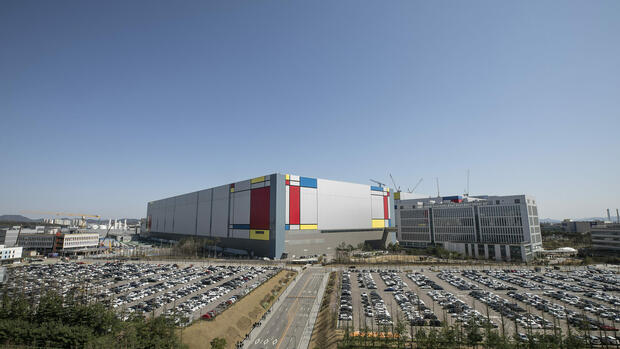Samsung operates huge chip factories in South Korea. But their utilization is low because the demand for electronic items is weak.
(Photo: Bloomberg/Getty Images)
Tokyo The semiconductor division of the world’s largest manufacturer of memory chips has not been hit so hard for 14 years. Samsung Electronics announced on Friday that, contrary to previous announcements, it would temporarily reduce the production of memory chips because demand had collapsed. The group also estimates that its operating profit fell to 0.5 to 0.7 trillion won in the first quarter of 2023 (350 to 490 million euros), around 96 percent less than a year earlier.
As usual, the group did not disclose the expected net profit or the results of the divisions in its first balance sheet estimate. Analysts blame the previous profit engine of the electronics group, the memory chip division, for the slump.
Driven by the high demand for smartphones and data centers, the division has contributed up to a quarter of the operating profit of the group in recent years, which is also the largest smartphone and one of the largest TV manufacturers in the world. However, according to a survey by the Korean news agency Yonhap, analysts are expecting a loss of three to four trillion won (two to 2.8 billion euros) for the first quarter.
That would be the company’s first chip division loss since 2009. Joanne Chiao from Taiwanese technology analyst TrendForce blames a consumer hangover after the corona pandemic. “After many people have stocked up on electronics in recent years, they now prefer to spend their money on travel,” she explains.
Therefore, the warehouses of Samsung sellers have filled up with TVs and other gadgets. The depletion of these inventories exacerbates the sluggish demand. This is also reflected in Samsung’s sales, which fell by around 19 percent to 62 to 64 trillion won (43 to 44.4 billion euros) compared to the previous year.
Production is severely curtailed
This double whammy is now forcing Samsung to cut its production unusually drastically. “We are adjusting memory production to reasonable levels for products for which we have built enough inventory to meet future demand,” the company said.
Industry analysts are predicting that semiconductor production may bottom out this quarter. Many companies are only expecting a recovery in the second half of the year. However, their strength is disputed.
While some experts expect a strong upswing, the Taiwanese analyst Chiao does not believe in it. “If I look at the demand for electronic devices, the recovery will not be very strong.” Instead, only the replenishment of heavily depleted inventories will boost demand for chips, “not final demand”.
The big question will be whether Samsung and its rivals in the chip crisis will also scale back investments in new factories. At Samsung, the main focus is on expanding contract manufacturing, the foundry business. Here the Koreans want to catch up with the world market leader TSMC from Taiwan. But the global foundry market is also shrinking. Analyst Chiao expects sales to fall by four percent by 2023.
More: Japan Joins US Chip Restrictions Against China
